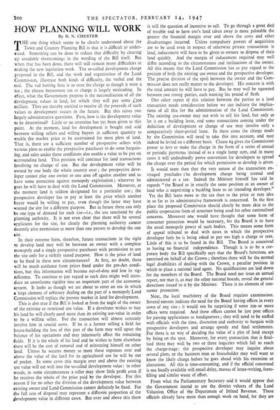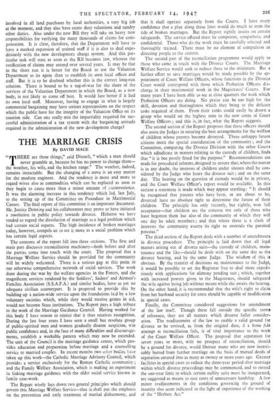HOW PLANNING WILL WORK
By D. N. CHESTER
THE one thing which seems to be clearly understood about the Town and Country Planning Bill is that it is difficult to under- stand. Something can be done to reduce that difficulty by clearing up avoidable shortcomings in the wording of the Bill itself. But when that has been done, there will still remain many difficulties in making the new legislation work. The so-called development charge proposed in the Bill, and the work and organisation of the Land Commission, illustrate both kinds of difficulty, the verbal and the teal. The red herring here is to treat the charge as though it were a tax ; the phrase betterment tax or charge is largely misleading. In effect, what the Government propose is the nationalisation of all the development values in land, for which they will pay some L300 million. They are thereby entitled to receive all the proceeds of such values as development occurs in the future. But this raises two largely administrative questions. First, how is the development value to be determined? Little or no attention has yet been given to this point. At the moment, land for development is bought and sold between willing sellers and willing buyers in sufficient quantity to enable the market price to be ascertained for most plots of land. That is there are a sufficient number of prospective sellers with various plots to enable the prospective purchaser to do some bargain- ing, and sales under these conditions also enable a value to be put on surrounding land. This position will continue for land transactions Involving no change of use. But the development value will be owned by one body the whole country over ; the prospective deve- loper cannot play one owner or one area off against another and so have some protection against monopoly exploitation ; wherever he goes he will have to deal with the Land Commission. Moreover, at the moment land is seldom designated for a particular use ; the prospective developer has to pay at least the price which another buyer would be willing to pay, eves though the latter may have wanted the site for a different purpose. But in future there can only be one type of demand for each s:te—i.e., the use sanctiond by the planning authority. It is not even clear that there will be several applicants for the site, for clearly the planning authority cannot decently give permission to more than one person to develop the one site.
In their extreme form, therefore, future transactions in the right to develop land may well be between an owner with a complete monopoly and a single prospective purchaser with permission to use the site only for a strfctly stated purpose. How is the price of land to be fixed in these new circumstances? At first, no doubt, there will be much guidance from prices fixed under the pre-Act condi- tions, but this information will become out-of-date and lose its sig- nificante. To continue to pay regard to such data might well intro-
duce an unwelcome rigidity into an important part of the economic system. It looks as though we are about to enter an era in which a large element of arbitrary dealing on the part of a monopoly Land Commission will replace the present market in land for development.
This is also true if the Bill is looked at from the angle of the owner of the existing or restricted use value. If a developer wishes to buy his land he will clearly need more than its existing use-value in order to be a willing seller. For the transaction will almost certainly involve him in special costs. If he is a farmer selling a field for house-building the loss of this part of the farm may well upset the balance of his operations and may injuriously affect the remaining fields. If it is the whole of his land and he wishes to farm elsewhere there will be the cost of removal and of reinstating himself on other land. Unless he secures money to meet these expenses over and above the value of the lani for its agricultural use he will be out of pocket. In some cases this margin over and above the existing use value will eat well into the so-called 'development value : in other words, in some circumstances a seller may show little profit even if he receives the whole of the price paid by the developer. For this reason if for no other the division of the development value between existing owner and Land Commission cannot definitely be fixed. For the full cost of disposal may represent a different proportion of the tlevelopment value in different cases. But over and above this there is still the question of incentive to sell. To go through a great deal of trouble and to have one's land taken away is more palatable the greater the financial ,margin over and above the costs and other disadvantages incurred. Unless compulsory powers of acquisition are to be used even in respect of otherwise private transactions in land, inducement will have to be given to owners to dispose of their land quickly. And the margin of inducement required may well differ according to the circumstances and inclinations of the owner.
All this means that the Land Commission has to pay regard to the position of both the existing use owner and the prospective developer. The precise division of the spoil between the owner and the Com- mission does not really matter to the developer. His concern is with the total amount he will have to pay. But he may well be squeezed between two strong parties, each wanting his pound of flesh.
One other aspect of this relation between the parties to a land transaction needs consideration before we can indicate the implica- tions of all this for the administration of the Land Commission.
The existing use-owner may not wish to sell his land, but only to let it on a building lease, and some transactions coming under the definition of development or change of use may involve only a comparatively short-period lease. In these cases the charge made by the Commission will need to take this into account, and may indeed be levied on a different basis. Clause 64 gives the Commission power to levy or make the charge in the form of a series of annual or periodic payments instead of as a single lump sum, and in many cases it will undoubtedly prove convenient for developers to spread the charge over the period for which permission to develop is given. It would seem then that the very nature of the transaction en- visaged precludes t he development charge being treated and administered as a tax.- Indeed the Minister himself has said he regards "the Board as in exactly the same position as an owner of land who is negotiating a building lease to an intending developer." Yet the Bill leans more to the tax than to the price or rent idea in so far as its administrative framework is concerned. In the first place the proposed Commissicn should clearly be more akin to the public corporation form of structure being used for other nationalised concerns. Moreover one would have thought that some form of consumer protection would be necessary, for the Board is to have the usual monopoly power of such- bodies. This means some form of appeal tribunal to deal with cases in which the prospective developer feels he is being asked to pay too high a charge or rent.
Little of this is to be found in the Bill. The Board is conceived as having no financial independence. Though it is to be a cor- porate body the Bill specifically says that the Board's functions are exercised on behalf of the Crown ; therefore there will be the normal legal disabilities of dealing with the Crown, a peculiar position in which to place a national land agent. No qualifications are laid down for the members of the Board. The Board need not issue an annual report, nor may it, as may the other national boards, reveal the general directions issued to it by the Minister. There is no element of con- sumer protection.
Next, the local machinery of the Board requires examination. Several reasons indicate the need for the Board having offices in every town of any size ; it Would not be surprising if some 200 or more offices were required. And these offices cannot be just post offices for passing applications to headquarters ; they will need to be staffed with officials with the time, discretion and authority to bargain with prospective developers and arrange speedy and final settlements. For there is no way of deciding the value of a plot of land except by being on the spot. Moreover, for every transaction that is final- ised there may well be two or three inquiries which fail to reach the charge-stage: the prospective developer may inquire about several plots, or the business man or householder may well want to know the likely charge before he goes ahead with his extension or alterations. All this is time-consuming, and if the official concerned is not locally available will entail delay, masses of letter-writing, form- filling and similar waste of effort.,
From what the Parliamentary Secretary said it would appear that the Government intend to use the district valuers of the Land Valuation Office of 'tlie Department of Inland Revenue. These officials already have more than enough work on band, for they are involved in all land purchases by local authorities, a very big job at the moment, and they also have estate duty valuations and sundry other duties. Also under the new Bill they will take on heavy new responsibilities for verifying the many thousands of claims for com- pensation. It is clear, therefore, that the Department will have to have a marked expansion of trained staff if it is also to deal expe- ditiously with the new development charge system. And this par- ticular task will start as soon as the Bill becomes law, whereas the verification of claims may extend over several years. It may be that in the short run it is better for the Board to use the Valuation Department as its agent than to establish its own local offices and staff. But it is to be doubted whether this is the correct long-run solution. There is bound to be a tug-of-war for the share of the services of the Valuation Department in which the Board, as a new body, is not likely to come off best. It would fare better if it had its own local staff. Moreover, having to engage in what is largely commercial bargaining may have serious repercussions on the respect which the public have for the integrity of the Valuation Office on its taxation side. Can one really mix the impartiality required for suc- cessful administration of a tax system with the bargaining attitude required in the administration of the new development charge?



































 Previous page
Previous page